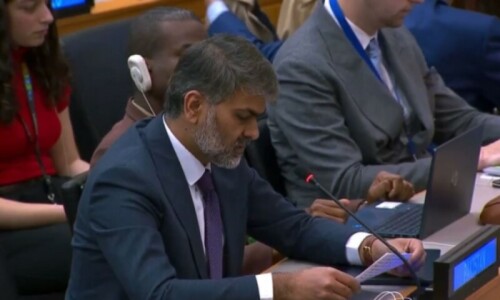NBA superstar Kyrie Irving's charity foundation has collaborated with a non-profit organisation named Paani to build a solar water centre that is reportedly providing "clean water and facilitating farming" in a remote area of Sindh's Thar region.
Irving's involvement in charity work in Thar came to light when Paani project, in a series of tweet on Wednesday, lauded the Brooklyn Nets guard for taking the initiative through his KAI Family Foundation.
"NBA superstar and humanitarian Kyrie Irving built a Paani solar water centre in Sindh with his K.A.I. Family Foundation," one of the tweets said, adding that the centre had made clean water accessible for over 1,000 village folks in the area.
Paani project further stated that the initiative had facilitated farming for families and was "providing light to women and children".
A video posted in one of the tweets highlighted the difficulties women face due to the shortage of water in Thar and how Irving's initiative has helped them overcome the problem.
Drought and deaths
Water shortage in Thar has been a long-standing problem and the National Assembly Standing Committee on Human Rights was told during a briefing in 2016 that as many as 828 children had died in Thar over the past three years, with the deaths largely being attributed to a prolonged drought.
"“At least 97 per cent area of Thar is desert and there has been no rain in the area for the last three years and because of this the availability of water has become a serious problem," Fazila Aliani, a member of the NCHR from Balochistan at the time, had highlighted. She had added that "People cannot cultivate their land and, therefore, there is also a serious nutrition problem. Livestock is also suffering because of lack of water.”
“The available water has excessive amount of chlorine in it and it is causing multiple health problems in the people. Besides, provincial and district governments have taken no proper steps to address these issues,” she had lamented.
Ailani had pointed out that the government decided to install 700 plants of reverse osmosis (RO) but only 432 were installed and a number of them had been out of order.
RO plants
In a more recent development, amid a crisis-like situation persisting in Thar and some other districts since closure of almost all reverse osmosis plants in the area months ago, the Thar Foundation had expressed its willingness in April to adopt all RO plants in Thar on a public-private partnership basis.
Referring to media reports suggesting that 95per cent of the 635 RO plants in certain districts had been lying dysfunctional, theThar Foundation had offered to run them to ensure the resumption of clean drinking water supply to the people of Thar.
The offer had come after the “successful” operation of 17 RO plants by the Thar Foundation in Islamkot taluka of the district for about four years.
















































